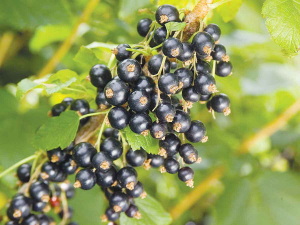One of New Zealand’s smallest fruits has the potential to improve the performance of our country’s sports people.
During the past 14 years, Plant & Food Research scientist Dr Roger Hurst and his team have been researching the potential health benefits of NZ blackcurrants. Along with researchers overseas, they have demonstrated that NZ-grown blackcurrants offer significant health benefits.
In the most recent publication, the benefits of consuming blackcurrants are shown to specifically relate to improving a sports persons performance by speeding up their recovery after exercise, training or a sporting event.
“We have got some good insights both into performance and recovery and managing the stress of recovery. Put simply, there is now no doubt that NZ blackcurrants do enhance performance,” Hurst told Rural News.
“Further, they aid recovery which also impacts on performance. If you recover quicker from fatigue and damage you are going to be able to perform better and you are going to be able to get back to your training quicker and get back on the field quicker.”
Hurst says blackcurrants, for example, improve blood flow and as a result are likely to improve oxygen delivery to, and remove waste products from, the muscles. He says they also help manage stress and inflammation and provide a degree of immunity.
Timing of intake is also a factor highlighted in the research. It suggests that blackcurrants are most effective when taken one to two hours prior to activity. The optimum effective dose appears to be between 105-210mg.
The key factor that sets NZ blackcurrants apart, Hurst says, is the level and mixture of different compounds called anthocyanins in the fruit.
“While all berries have high concentrations of anthocyanins they have different anthocyanins – not all berries are equal,” he explains. “The physiological effects of different berries suggest that they don’t all have the same bioactivity. When it comes to sporting performance, New Zealand blackcurrants may pack more punch than other berries.”
One of the challenges facing researchers worldwide has been to work out what makes NZ berries better than those grown elsewhere in the world. While soil types can often influence quality, as can the genetics of the plant, Hurst says NZ has an advantage.
“Climate,” he says. “Our long sunny days and ultraviolet exposure is critical for the ripening process and this likely drives the development of the right mix of anthocyanins to appear in the fruit that are responsible for the dark colour and the health benefits.”
To protect the unique qualities of the NZ blackcurrants and to differentiate them from berries in other countries, Plant & Food Research and the NZ blackcurrant industry have developed a brand called Adaptive.
The purpose of this initiative Hurst says is to provide consumers with a guarantee that the product they are buying is from NZ and will deliver the value proposition. While some people like to consume sports drinks to give them energy for exercise, they do not necessarily need to give these up.
“We are saying that there is scientific evidence that there are additional benefits to be gained from the anthocyanins in blackcurrants and that this is another option for them to help improve their performance,” Hurst explains.
NZ blackcurrants are sold in different forms – frozen berries, juice concentrate, juice ready to drink and powdered products. Hurst says any of these forms can likely enhance performance.
With the proof in the science, Plant & Food Research and the NZ industry are looking at promoting the Adaptive brand products in the USA, Japan, Asia and New Zealand.



















